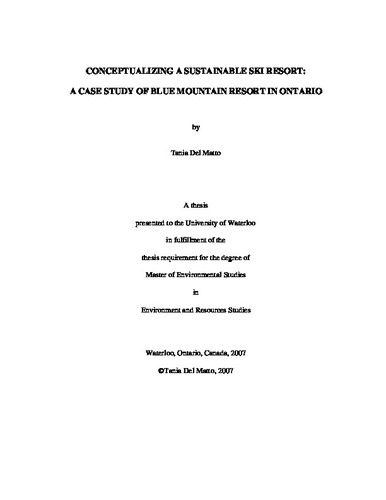| dc.description.abstract | Sustainability has become a goal for many recreational tourism businesses. For ski resorts, the goal of sustainability has been driven by a growing understanding of the impacts ski resorts have on the biophysical environment and the host communities in which they reside. In addition, ski resort owners and operators have an inherent self-interest and ethical responsibility as corporate citizens to pursue sustainability. Has a sustainable ski resort, however, been adequately defined at a conceptual level?
The current understanding of sustainable ski resorts is limiting because it encourages ski resort owners and operators to address sustainability challenges in a compartmentalized fashion and in isolation of one another. This thesis examines how ski resorts would benefit from taking an integrated systems approach to sustainability—an approach that when applied, can be used to assess the state of sustainability at an organization and can broaden the scope of decision-making at an organization. This approach is missing in an industry where sustainability has historically meant focusing on achieving outcomes in efficiency thus failing to acknowledge the broader socio-ecological footprint of a ski resort.
Gibson et al. (2005) argue the journey toward sustainability ought to be guided by a set of requirements based on principles of sustainability. Such principles operate on an integrated systems approach. This thesis uses the Gibson principles as the criteria by which to assess literature that discusses desirable characteristics of businesses and recreation/tourism destinations in sustainability terms. The intention here is to incorporate context specific insights into the Gibson principles such that the Gibson principles are adapted for ski resorts. The sustainable ski resort principles emerge out of this adaptation process and are applied using an exploratory case study. Specifically, the principles are compared against the current conditions of sustainability at Blue Mountain Resort (BMR), located in the Town of Blue Mountains (Ontario), with the goal of assessing the state of sustainability at BMR.
The analysis resulted in the identification of five areas where the sustainable ski resort principles advanced the understanding of what constitutes a sustainable ski resort. First, the sustainable ski resort principles clearly require that there be limits on quantitative growth and, as such, ski resorts must strive towards decoupling improvements in quality and service from further growth and consumption. Second, a sustainable ski resort contributes to narrowing the socio-economic gaps within the workplace and the host community while operating within a multigenerational timescale to ensure future generations are fairly represented. Third, a sustainable ski resort reduces its net consumption of materials and resources and invests these savings in areas that are deficient in natural and social capital. Fourth, the sustainable ski resort principles require decision making power to be shared amongst internal and external stakeholders. Fifth, stakeholders must pursue opportunities to arrive at decisions that strengthen the well-being of both human and ecological systems through the integrated application of the sustainable ski resort principles.
The analysis of the case study findings reveals that five of the eight sustainable ski resort principles are partially realized as represented by BMR’s demonstrated leadership amongst ski resorts in Ontario in the areas of solid waste reduction, energy efficiency and staff/public education.
As evidenced in the case study, the ski resort industry’s responses to its sustainability challenges have largely been handled in isolation using conventional approaches to decision-making that tend to address sustainability challenges as separate entities. This perpetuates the notion that sustainability challenges are detached and therefore detached solutions are proposed or pursued. These approaches fail to recognize the linkages and interdependencies between entities thereby failing to pursue integration—the essence of sustainability as articulated by the sustainable ski resort principles. | en |

